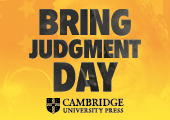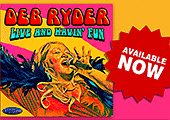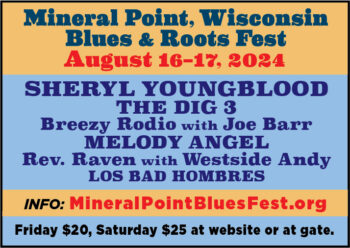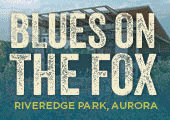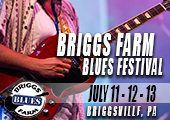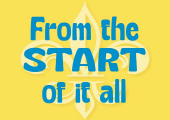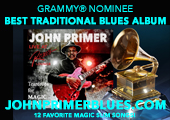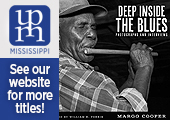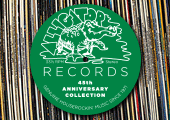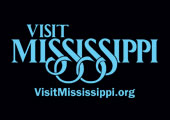JOHNNY TUCKER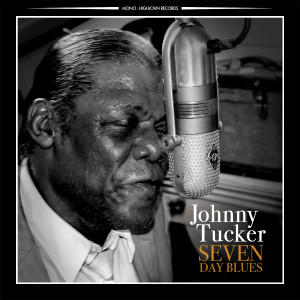
Seven Day Blues
High John – 007
Johnny Tucker has been a fixture on the Los Angeles blues scene since he arrived there in 1964, most notably playing the drums behind Johnny Otis and Phillip Walker, with whom he recorded for Playboy, HighTone and Black Top. In 1997 Tucker and his longtime section mate, bassist James “Broadway” Thomas, cut a CD titled Stranded for HMG, and a previous High John disc, Why You Lookin’ At Me?, came out in 2002.
For Tucker’s second outing for his label, High John’s Bob Auerbach brought in guitarist Big Jon Atkinson to serve as producer and engineer. In contrast to the horn-driven, Texas-to-California sound of its predecessor, Atkinson and Tucker chose to return to the classic Chicago ensemble blues circa 1960, even to the extent of employing vintage recording equipment and techniques. The result finds Tucker and his mates laying down groove after groove with a sound somewhere between Howlin’ Wolf (with Atkinson borrowing the signature guitar figure of Wolf’s Howlin’ for My Darlin’ on the opening Talkin’ ’Bout You Baby) and Little Walter (with echoes of Walter’s Blue and Lonesome on the closing You Can Leave My House). These, like all of the disc’s 15 cuts, are Tucker originals, and there’s not a weak one in the lot. Tucker’s gritty, yet flexible, vocals are up front in the mix where they belong, and the band—with Atkinson joined by Scot Smart on guitar or bass, Troy Sandow on harmonica or bass and Malachi Johnson or Marty Dodson on drums (with guest spots for Bob Corritore’s harp, Kid Ramos’ guitar and Bob Welch’s organ)—is fully at ease in the Windy City idiom.
Although unapologetically retro in its approach, this is a set that in no way sounds dated, and it marks a high point in Tucker’s career that should be kept in mind when award season next rolls around.
—Jim DeKoster
BETTYE LAVETTE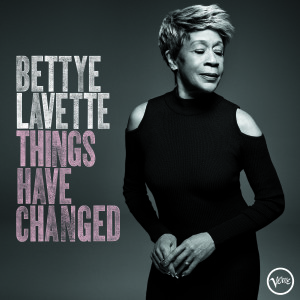
Things Have Changed
Verve – No #
Bettye LaVette isn’t just one of the finest soul singers of our time—she’s also one of the great modern stylists, with an uncanny ability to imbue any song she sings with deep conviction and lived-in truth. The Michigan native’s latest release finds her turning to the Bob Dylan songbook, and it’s a sublime marriage of performer and material. LaVette’s voice and Dylan’s words both contain multitudes, and on Things Have Changed she reveals fresh colors and new meanings in her stunning interpretations of his songs.
This isn’t the first time LaVette has recorded Dylan—fine versions of Most of the Time, Everything Is Broken and Unbelievable have appeared on previous compilations and studio albums—but this is her first collection of songs penned by a single songwriter. Produced by Steve Jordan, who also plays drums and percussion, the excellent backing ensemble features Dylan band veteran and multi-instrumentalist Larry Campbell, keyboardist Leon Pendarvis and bassist Pino Palladino.
Never one to reverently cover, LaVette rearranges and changes each of the 12 tracks to suit her own tastes. It Ain’t Me Babe’s protestations are no longer daringly playful folk, but earnest, firm Muscle Shoals–style soul; the flirtatious longing of Mama, You Been on My Mind becomes a tender, heartbreaking ode to a departed mother. Political World’s hard-driving beat melts into a murky, Meters-esque funk, punctuated by brief, stinging solos from guitarist Keith Richards. A Crescent City vibe also filters through What Was It You Wanted (both it and Political World are taken from Dylan’s New Orleans–recorded album Oh Mercy) with Trombone Shorty’s amber-toned horn trading places with Dylan’s hazy harmonica. Set against atmospheric strings and organ, Ain’t Talkin’ is even more eerie and dystopian than the original.
LaVette’s voice is an exposed nerve, a pure vein of raw sound, and she mines every last ounce of feeling from each syllable. She does this best on the ballads Don’t Fall Apart on Me Tonight and Emotionally Yours, where her ragged, tender whispers and wails render them into frankly sensual pleas of love and desire.
If Things Have Changed for Bettye LaVette it’s only for the better, as she’s made her most masterful, soul-searing album yet.
—Melanie Young
VANCE KELLY & HIS BACKSTREET BLUES BAND
How Can I Miss You, When You Won’t Leave
Wolf – 120.838
Vance Kelly was born into the blues in 1954 in a basement on Chicago’s Maxwell Street and was only 15 when he scored his first gig playing guitar behind West Side chanteuse Mary Lane. After spending most of the ’70s lost in the disco wilderness, he returned to the blues with stints backing Buddy Scott, A.C. Reed and Little Johnny Christian, with whom he recorded for Leric in the mid-’80s. His first album, however, did not come until 1994’s critically acclaimed Call Me on Wolf. Eight more CDs would follow for that label, including live dates at Lee’s Unleaded Blues in 1999 and Kingston Mines in 2014, as well as a compilation album in 2012.
Now, for his tenth CD on Wolf, Kelly has returned to the studio to cut his first album of all-original material with the current edition of his skin-tight Back Street Blues Band, now made up of trombonist Johnny Cotton, saxophonists Gary Salomon and Charles Kimble, John Walls on keyboards, Stan Mixon on bass and Johann Ross Jr. or De Shun Burns on drums, Dayrock and bass, with backing vocals courtesy of Ethel Reed and several of the bandsmen. The set kicks off with the musically and lyrically upbeat (“The blues is not sad music”) All About Life, followed by the George Benson–influenced instrumental Biscuits, Eggs, and Sausage. Another instrumental, aptly titled Jamming in the Studio, closes the set with solo space for both saxophonists, and Come On serves as a regrettable reminder of Kelly’s disco days. The rest of the disc’s 14 tracks, however, are solid examples of Kelly’s songwriting abilities. Get Home to My Baby is a straight blues taken at medium-slow tempo, the title track steps along in a Tyrone Davis groove, Moving On is an up-tempo, stop-time shuffle and Don’t Give My Love Away is the set’s most incendiary offering. Other standouts include the double-entendre Rumble Through Your Drawers, the redemption song Back on Track and the cautionary Sticker Than You.
This set provides ample proof that, 24 years after his debut recording, Vance Kelly remains at the forefront of the contemporary Chicago blues scene.
—Jim DeKoster
JIMMIE VAUGHAN TRIO, FEATURING MIKE FLANIGIN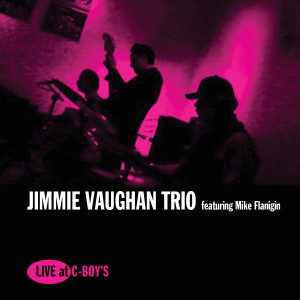
Live at C-Boy’s
The Last Music Co. – No #
It’s obvious that Jimmie Vaughan needs no introduction. His tenure at the helm of the Fabulous Thunderbirds bequeathed him a reputation and pedigree as one of Texas’ most renowned guitarists and gave him the credence to stand on equal footing with many of the Lone Star State’s great axeman. It also laid the groundwork for a singular career that’s still based in the blues, but which also finds him piercing parameters with eloquence and imagination.
Consequently, Live at C-Boy’s serves as an ideal platform for a series of mostly instrumental arrangements performed by Vaughan and his equally accomplished compatriots—organist Mike Flanigin and the late drummer Barry “Frosty” Smith, the latter being the one-time foil for singer/keyboardist Lee Michaels. Although the set-up makes this a fairly barebones trio, they share a compatible approach as it’s applied to this selection of covers, which they recorded live at C-Boy’s Heart and Soul club in their hometown environs of Austin, Texas.
As evidenced from the results, Vaughan and Flanigin are solid soloists, and their instrumental interplay and call-and-response riffing finds them consistently in sync. The set list relies mostly on familiar standbys—jazzy takes on the Beatles’ Can’t Buy Me Love, a loose and limber version of the popular oldie Hey! Baby and gritty versions of the blues standards Saint James Infirmary and Dirty Work at the Crossroads among the standouts—and it’s apparent throughout that the three musicians welcome the chance to stretch out without conforming to the constraints of their own makeshift melodies. Indeed, these offerings rely less on vocals and more on extended instrumental forays to etch an ultimate impression.
That said, the music mostly brings to mind the sounds heard in a late night club or cabaret, where the emphasis is more on getting into a groove than inspiring a sense of concerted concentration. However, given an appreciative audience and the generally mellow vibe, Vaughan, Flanigin and Smith seem content to simply serve up their pleasant pastiche. As a result, Live at C-Boy’s becomes an effective exercise in the use of both subtlety and skill.
—Lee Zimmerman
MARCIA BALL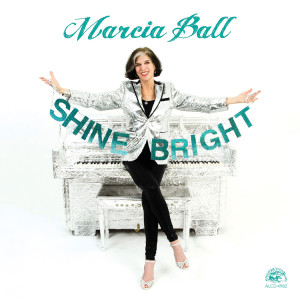
Shine Bright
Alligator Records – AL 4982
Marcia Ball chose a perfect title for her album, for the facets of every musical gem on this new album shine brightly with the light of Ball’s deep love for all kinds of music. It’s been 50 years since she released Gum, but Ball sings and plays just as passionately and still brings her high level of energy to every song. She’s having fun with her music, and Shine Bright soars with a joyous spirit.
The raucous, gospel-inflected title track launches the album with an infectious vibe that lifts our hearts and spirits and bodies, straight off the chair and onto the nearest dance floor. The tune opens with an urgent call-and-response patter between Ball’s piano and the other instruments before steadily ascending to a gloriously fervent celebration of various acts of individual courage and an ardent encouragement for everyone to embrace their own abilities to shine bright. The bridge features Mike Schermer’s searing guitar talking back to Ball’s funky piano; this section elevates the song into a burning, shining anthem that urges us to: “Shine bright / Be who you want to be / Shine bright / For all the world to see / Shine bright / We’re making history / Every time we breathe / Trying to do it right.” Ball shouts out the names of many whose lives shine bright: Jackie Robinson, Martin Luther King Jr., Neil Armstrong, Irma Thomas, Ruth Bader Ginsburg. They Don’t Make ’Em Like That is a steely-eyed, nostalgic tribute to days long gone and the ways that music, or objects like cars, are built to last. In a tune whose phrasing is reminiscent of Stack O’Lee and a late 1950s rocker, Eric Bernhardt on tenor sax and Steve Berlin on baritone stir in some soulful flavor when Ball reminisces about hearing King Curtis at a club, blowing a Curtis sax line just after Ball shouts out his name. Ball’s version of Ray Charles’ What Would I Do Without You might be better than the original; it’s a slow-burning soul song whose simmering blues mirrors the singer’s longing and desire. Once in a Lifetime Thing is a feel-good song about the once-in-a-lifetime experience of a “real true love” that has the sound of some great old Carolina beach music and Ray Charles’ Hallelujah, I Love Her So. In World Full of Love, the most beautiful song on the album, written by Ball and Kimmie Rhodes, the singers remind us that we “all hold the truth” and “in goodness we trust” in this “world full of love.” It’s a plea and a reminder to hold close what we have and to cherish the gift of love we’ve been given. The spare sounds of Ball’s piano, Schermer’s acoustic guitar and Red Young’s B-3, along with Ball’s, Rhodes’ and Jolie Goodnight’s vocals, powerfully preach the message of love.
Shine Bright is Ball’s precious gift to us, urging us to love others, to love the acts of others that have made us who we are, to cherish the memories of those who’ve established the world we live in and to celebrate the beauty of music—and to get down and dance to some rollicking music and have a good time.
—Henry L. Carrigan Jr.
GREG SOVER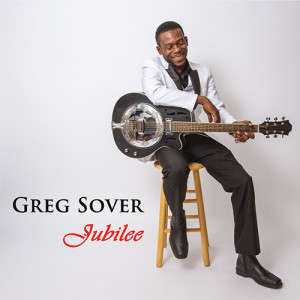
Jubilee
Greg Sover & Grounded Soul Records – No #
Jubilee celebrates Sover’s smart songwriting and his knack for finding the just right guitar phrasings and melodies. He’s a blues guitarist who plays with a soul man’s insight and a rocker’s sonic vision. He’s joined here by Garry Lee on bass and background vocals, Allen James on electric guitar, Tom Walling on drums and Wally Smith on keyboards.
The minor chord, symphonically structured Hand on My Heart could find company among any of Fleetwood Mac’s Bob Welch–era albums. The repetitive guitar chords build, layer upon layer, to create a sonic hypnotic effect. The song opens with the soft strumming of an acoustic guitar, slowly building to a crescendo of sound. It’s a heartbreak song but one that captures the irony of a familiar gesture: “Put your hand on my heart,” the singer pleads, not to feel how much it’s beating in love but to feel it “beat before it breaks.” As the Years Go Passing By opens with a searing guitar solo that telegraphs the pain and longing of the song. This slow-burning blues illustrates Sover’s canny playing and his ability not to waste notes on his solos. There’s an understated beauty to the song that reveals Sover’s quiet way of writing a blues song. Temptation, recorded live, is a straight-ahead, down-and-dirty tune that gives Sover a chance to stretch out on his rock riffs and to let the notes cascade down the frets as he showers us with his lead solos. The title track recalls Savoy Brown’s Poor Girl from Looking In with a guitar as crisp as Kim Simmonds; Sover’s song is a paean to a woman who “eases my pain from a mile away.” She’s the “fix” the singer needs, and she’s like therapy to him.
Jubilee solidifies Sover’s work as a guitarist, allowing him to showcase a variety of different styles. He reaches into our hearts with soulful songs such as Hand on My Heart even while he’s delivering a fiery blues rocker on Temptation. Sover’s versatility reveals his musical genius, and this album should gain him a wider audience.
—Henry L. Carrigan Jr.
JAMES HARMAN
Fineprint
Electro-Fi – 3454
“The large print giveth, but the fine print taketh away,” preaches James Harman over a John Lee Hooker boogie groove on the title track of his new Electro-Fi release. Still holding court after five decades of playing the blues professionally, Harman is now firmly ensconced as one of the great contemporary sage-tricksters of the genre.
Harman is a fine harmonica player, despite being somewhat coy at times about his relationship to the instrument (“it’s just a little old whistle,” he once quipped in an interview); however, his greatest strength has always been his ability as a lyricist. This reviewer once had the pleasure of watching an inspired Harman spontaneously sketch out his song Green Snakeskin Shoes on a used bar napkin, with Rick Estrin assisting, backstage at one of Mark Hummel’s Blues Harmonica Blowout tours in the early 2000s. What a sight.
That same spontaneity, a sense that anything can happen, is captured here as well, where Harman is joined again by longtime collaborator Nathan James, whose guitar lays the rhythmic foundation for Harman to do what he does best—tell stories. On the opening Fineprint, a streetwise Harman cautions listeners to watch for what might be hidden in those “lawyer hieroglyphics.” On At the Flophouse, “where life cuts a new deal every day,” Harman narrates the struggles of a motley cast of characters, punctuated by blasts from his chromatic harmonica.
Sonny Leyland’s piano on the first of twin takes of What ’Cha Gonna Do ’Bout Me lends a New Orleans, second line feel to the proceedings. On one of the standout tracks, Memory Foam Mattress, the titular bed is transformed into a metaphor for a relationship gone rotten. Here, Harman delivers what may be one of the cleverest passages on the record: “I cashed in all those bottles you had blocking my garage / My troubles are all disappearing now like they’d been a damned mirage / When that insurance check finally comes in, I’ll create you a little shrine / And I’ll be smiling at it every morning, knowing you’re in hell and doing fine.”
As is typical of many of Harman’s releases, Fineprint marries recordings from various sessions, including a handful that were engineered by Jerry Hall before he died in early 2014. For those who acquire the physical CD, don’t forget to read the fine print—Harman’s personal notes describing each track make for an enjoyable read.
—Roger Gatchet
MARIE KNIGHT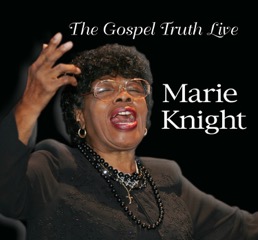
The Gospel Truth Live
M.C. Records – MC-0084
As pivotal a role as singer Marie Knight played in the emergence of gospel music, particularly in the 1940s and 1950s, she remains surprisingly under-recognized. During those decades, she recorded and toured as a solo artist and fronted groups like the Sunset Four and the Millionaires; however, she made her greatest impact as a collaborator with Sister Rosetta Tharpe, touring and recording such classics as Beams of Heaven, Up Above My Head and Didn’t It Rain. Her own Gospel Train reached No. 9 on the R&B charts as she crossed over from the sacred to the secular in the late ’50s, performing on bills with Gene Chandler, Brook Benton and the Drifters. She also made a name for herself in Great Britain working with Humphrey Lyttelton, and in the mid-1960s, Manfred Mann scored a hit with a cover of her Come Tomorrow. By 1980, Knight drifted away from the music business and dedicated herself to work at the Gates of Prayer Church in Harlem, where she became pastor in the early 1990s.
She returned to the music scene in 2003 to record an update of Didn’t It Rain for Shout, Sister, Shout: A Tribute to Sister Rosetta Tharpe. The album’s producer, Mark Carpentieri, became Knight’s manager, and she resumed her gospel music career, recording Let Us Get Together: A Tribute to Reverend Gary Davis (2007) with support from guitarist Larry Campbell and guest spots from harmonica player Kim Wilson and singer Catherine Russell. Recorded at the Massachusetts College of Liberal Arts Gospel Fest a few months after the release of the Davis tribute, The Gospel Truth Live captures a profoundly moving and dynamic performance by the then 87-year-old singer, accompanied solely by pianist and background vocalist David Keyes.
Knight delivers a program that includes six selections from the Let Us Get Together CD (I Belong to the Band, 12 Gates to the City, I’ll Fly Away, I Am the Light of the World, Lord I Feel Like Going On and Let Us Get Together), the three tunes drawn from her collaborations with Tharpe mentioned above and a few gospel standards (Jesus Loves Me, How I Love Jesus and For Thine Is the Kingdom). Knight seems right at home with the shift in accompaniment from Campbell’s rootsy guitar-driven work on the Davis CD to Keyes’ muscular, driving piano, which likely can be attributed to the fact that many of her vintage recordings from the ’40s and ’50s featured the irrepressible boogie-woogie piano master Sammy Price.
During the hour-long program, Knight intersperses short segments of preaching that serve as song introductions and reveal not only her fervent faith but a deep insight into human nature and a wry humor, establishing a warm, honest rapport with the audience (and the listener to the recording). Though her powerful contralto voice does seem to have diminished over the years, Knight sings all the songs, whether they are her iconic hits or the Davis repertoire that she had only recently learned, with a tremendous warmth, power and conviction. There are no frills, no pretensions; this music is straightforward and soulful old-time gospel music delivered by a stunning singer and masterful pianist. Knight died two years after this performance, and The Gospel Truth Live is an inspiring swan song for an artist who deserves wider recognition for her contributions to the gospel music tradition.
— Robert H. Cataliotti
VARIOUS ARTISTS 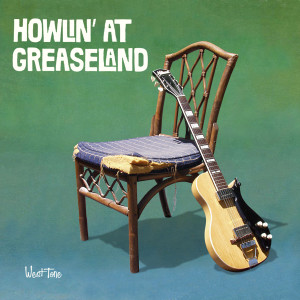
Howlin’ at Greaseland
West Tone – WTR CD-1708
Howlin’ at Greaseland pays homage to the music of Howlin’ Wolf with a tight, well-crafted set from an accomplished Greaseland crew and guest artists. Each track features a different lineup with plug-and-play combinations of ace guitarists Kid Andersen, Rockin’ Johnny, Chris James and Johnny Cat; harp blowers Rick Estrin and Aki Kumar; and singers Alabama Mike, John Boyd, Lee Donald, nonagenarian keyboard master Henry Gray and Chicago West Side vocalist Tail Dragger—the latter two having both performed with Howlin’ Wolf’s band. Among the keyboard and rhythm section lineups are such great players as Jim Pugh, Vance Ehlers, June Core and saxophonist Terry Hanck. The tribute is complemented by a clever visual reference to the cover of Howlin’ Wolf’s iconic third LP, often referred to as the “rocking chair album.”
Howlin’ is a collection of classic Wolf tracks from the 1950s and ’60s that focuses on vocals and spirited grooves, with a welcome near-abstinence from soloing.
Singing the opener is the expressive Alabama Mike who opts for Wolf’s impassioned shout and then ad-libs nicely to fade on Meet Me in the Bottom (and this listener would not have begrudged him at least one additional track).
Vocalist John Boyd, born in Greenwood, Mississippi, employs his big-voiced basso on three tracks including a howling take on Smokestack Lightnin’ (with Rick Estrin’s deep-lunged approximation of Wolf’s savage, near-aspiration of the harmonica), Riding in the Moonlight and the closer, a short, straight reading of Spoonful.
Tail Dragger adds his lupine, raspy roar to the lesser-known, Wolf-penned track I’m Leaving You, as well as to the loping, one-chord Don’t Trust No Woman, backed on both by his old pal, the ever-trusty Rockin’ Johnny on guitar, with Aki Kumar on harp.
While it may have been in Wolf’s repertoire, he never recorded Worried Life Blues, sung here by his former piano player Henry Gray. Gray also sings and performs a lovely, low-key, piano-acoustic guitar duet with Kid Andersen on Little Red Rooster.
To round it out, Lee Donald sings a creditable Forty Four, accompanied by Kumar’s fine harp work, with June Core dropping bombs behind.
Howlin’ at Greaseland is a very good, and seemingly effortless recording that captures the love and facility these fine musicians have for the timeless blues of Howlin’ Wolf.
—Justin O’Brien
THE NICK MOSS BAND FEATURING DENNIS GRUENLING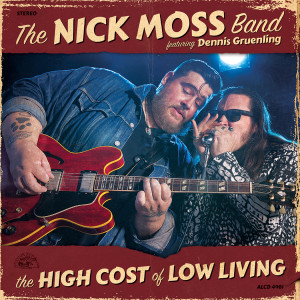
The High Cost of Low Living
Alligator Records – ALCD 4981
It would be enough if the Nick Moss Band coasted by on the searing fretwork of its namesake guitarist, content to leave him alone to fire up the fray. Happily, though, Moss is wise enough to share his billing with an able support crew that now includes harmonica virtuoso Dennis Gruening, at this point clearly one of the best in the biz. Consequently, The High Cost of Low Living, the duo’s debut under the venerable Alligator Records banner, yields a super summit of sorts, one that finds Moss and Gruenling trading licks in a full throttle demonstration of sheer boogie, verve and instrumental agility.
It’s not that the two men were unacquainted; according to their press materials, they’ve known each other some 20 years. That chemistry is apparent here, particularly in the call and response riffs exchanged between them. Not surprisingly, that shared rapport dominates such ruggedly up-tempo tunes as Crazy Mixed Up Baby, Get Right Before You Get Left, Tight Grip on Your Leash and Rambling on My Mind. Gruenling himself excels on All Night Diner, a rollicking instrumental tour de force that stands out as one of the album’s most adept examples of both drive and dexterity. On the other hand, Moss’ vocals boast a command and authority that elevate the music through his assertive presence alone. His simmering growl on the slow, strutting No Sense and emotive wail on Note on the Door make each a definitive example of pure blues at its most urgently expressive.
Ultimately, The High Cost of Low Living works within a well-defined template. While Moss and Gruenling clearly command the spotlight, a sturdy rhythm section, a brass component and ace piano plucker Taylor Streiff provide a flourish of their own, imbuing these arrangements with an additional source of resolve and revelry. Streiff in particular proves a robust team player; his frenzied forays on Get Your Hands Out of My Pockets and Count on Me add a fluidity that helps these grooves attain their full forward thrust. Indeed, the drive is sustained throughout, and even when there’s a temporary turn to more somber proceedings on the deliberately paced He Walked with Giants (Ode to Barrelhouse Chuck), the commitment is never in question.
It’s the rare ensemble that can channel assets from so many quarters. With The High Cost of Low Living, Moss and company manage to achieve that goal both efficiently and effectively
—Lee Zimmerman


